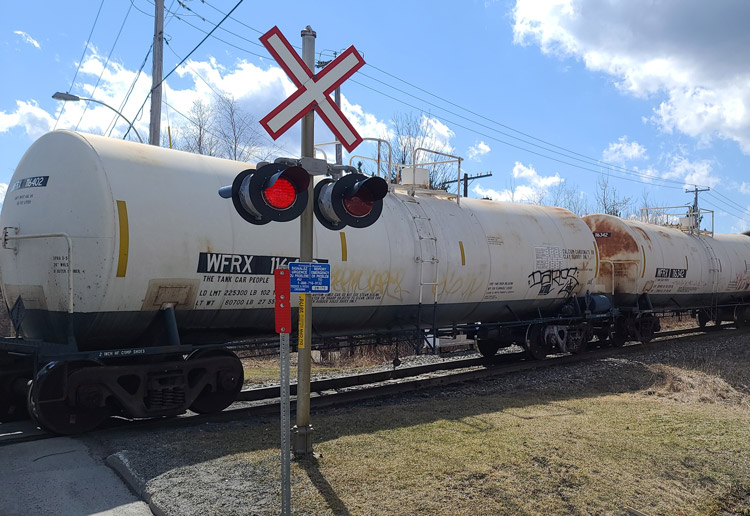FRONTENAC, Quebec — Some 70 workers, farmers, area residents and others turned out to a press conference here March 10 called by the Union of Agricultural Producers and the Union of Forestry Producers of Southern Quebec, which represents landowners who grow trees for logging. They were protesting recently announced federal government plans for land expropriations to build a rail bypass around Lac-Mégantic. Frontenac Mayor Gaby Gendron chaired the panel.
So far 33 forestry and farm owners have received expropriation notices, in addition to a number of institutions. Yolande Boulanger, a farmer in her 80s, told the press her land will be cut in two with no guarantee of access between them.
Lac-Mégantic, a town of under 6,000 near the Quebec-U.S. border, was the site of the 2013 runaway crude oil train derailment and explosion that killed 47 people and burned out the downtown core.
Militant worker-correspondents, including Félix Vincent Ardea, a Canadian National Railway conductor and Teamsters union member, attended the press conference and spent several days talking to working people in the area.
Ottawa promised to build the bypass under pressure from many residents concerned about the possibility of another train wreck.
The projected route affects the smaller communities of Frontenac and Nantes as well as the loggers.
Farmers’ unions and many resident and environmental groups are seeking ways to change the route or stop the bypass altogether. Others want construction to move ahead now, with the 10-year anniversary of the July 6, 2013, disaster approaching.
Freight trains, while not yet again transporting crude oil through Lac-Mégantic because of the local opposition, have been carrying hazardous cargo for the past decade — including tankers full of the same toxic vinyl chloride that was released in the Feb. 3 derailment in East Palestine, Ohio.
CP Rail ‘real boss’ of bypass project
“The real boss of the rail bypass project is Canadian Pacific,” André Roy, president of the forestry producers’ union, told the press conference.
Michel Brien, local Union of Agricultural Producers president, said that the new bypass “will be ceded to CP, the company will be the sole beneficiary, being able to increase the speed and length of the trains.”
Robert Bellefleur, spokesperson for the Coalition of Citizens and Organizations Committed to Railway Safety of Lac-Mégantic, which has fought for a bypass but opposes the proposed operating conditions on the new track that would permit Canadian Pacific to run trains at 40 mph through the industrial park, told the Militant, “CP, which is responsible for the tragedy in 2013, will get a nice present of $1 billion (the current estimated cost of the bypass).”
Canadian Pacific rail officials themselves confirm this assessment, telling Trains online magazine that the new track will give them “leverage” to beat out their competitors.
Discussions we had with residents in Lac-Mégantic, Nantes and Frontenac focused on the pressing need for rail and community safety.
Lac-Mégantic and East Palestine
“It’s obvious there’s a link between Mégantic and East Palestine. In both cases, it’s safety,” said Gilles Carrette, a retired provincial road repair worker and member of the Coalition of Citizens and Organizations Committed to Railway Safety of Lac-Mégantic.
Residents describe daily problems caused by the increasing length of the trains passing through. “The other day, it took me 40 minutes to take my youngest to the day care,” Frontenac resident Myriam Rosa said. “Two level crossings were blocked. Normally, it takes five minutes.”
Bellefleur asked Montreal-area rail worker Vincent Ardea what happened in East Palestine. “How do the hot box detectors work? Who gets the message?”
“Everyone hears the message on the radio,” he replied. But to save on time and money the mechanical hot axle warning system was set by management to only issue an alarm on temperatures so high, it went off too late for the crew to stop the train.
“Through our unions, rail workers can fight for more inspections and more workers to run the trains, repair the equipment and tracks,” he said, pointing to the example of rail workers in Greece following the deadly crash there that killed over 50 people Feb. 28. “By going on strike and mobilizing thousands in demonstrations, rail unions in Greece are showing how unions can lead the fight for rail safety.
“Working people and our unions need to create their own committees, drawing in farmers and other area residents, to force out the facts and decide how best to defend ourselves and meet our needs, free from ruling-class pressure,” Vincent Ardea told the Militant. “Rail workers and our unions can play a big part in this.”
“My father-in-law was a railway conductor,” Frontenac Mayor Gendron said. “He knows the problems on every inch of the track.”


